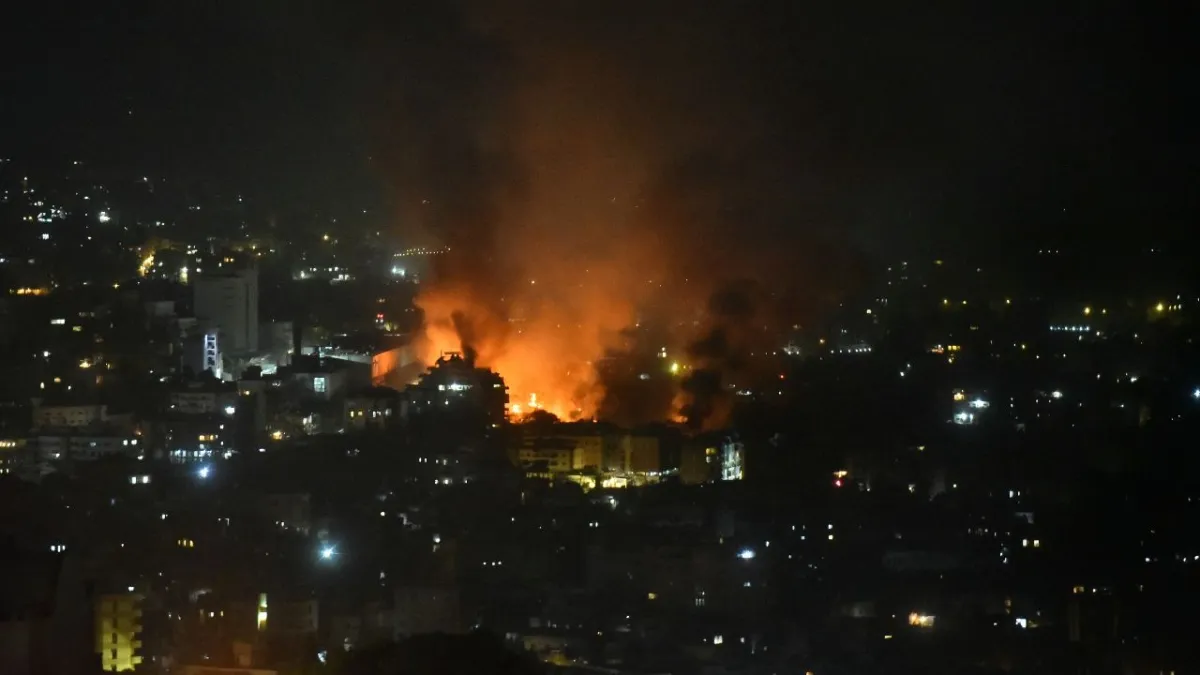
Israel carried out two rounds of airstrikes on Hezbollah’s main stronghold south of Lebanon’s capital, Beirut, sending huge clouds of smoke rising over the densely populated area.
>>> You can also read: Conflict in the Middle East: Israel and Hezbollah intensify attacks
Friday’s attacks were heard throughout the Mediterranean city and caused panic in the residential area that has been the main stronghold of the Iran-backed movement for decades.
They were by far the fiercest attacks to hit Beirut since Israel shifted its focus from the war in Gaza to Lebanon this week, attacking Hezbollah strongholds across the country and killing hundreds of people.
Israeli television networks reported that Hezbollah chief Hassan Nasrallah was the target of the attack, although a source close to the group said he was “fine.”
Nasrallah enjoys cult status among his Shiite Muslim supporters and is the only man in Lebanon with the power to wage war or make peace, but he lives a life in hiding to avoid being killed.
The Israeli military claimed Saturday morning that its airstrikes killed “Muhammad Ali Ismail, commander of Hezbollah’s missile unit in southern Lebanon, and his deputy,” as well as “other senior officials.”
The attacks were “like an earthquake,” according to Ahmad Ahmad, who fled his home in the southern suburbs.
Abir Hammoud, a teacher in her 40s, said: “I felt like the building was going to collapse on me.”
The attacks were followed by a second bombing hours later, which the Israeli military said targeted Hezbollah weapons stored in buildings in the area, a claim the group denied.
Hezbollah began fighting Israeli troops along the Lebanese border a day after its Palestinian ally Hamas launched its unprecedented attack on Israel on October 7.
Israeli Prime Minister Benjamin Netanyahu promised in a speech to world leaders this Friday that There will be no respite in the battle against Hezbollah until Israel’s northern border is secured.
Warning to civilians due to fighting between Hezbollah and Israel
A source close to Hezbollah said that the initial wave of attacks had leveled six buildings and, according to a preliminary estimate, six people died and 91 were injured.
Israeli military spokesman Daniel Hagari said the attack targeted Hezbollah’s “headquarters” in the city’s southern suburbs.
Following the Beirut attacks, Hezbollah claimed it had fired more rockets against Israel “in defense of Lebanon and its people.” There were no immediate reports of casualties.
The Israeli military warned civilians in some parts of Hezbollah’s stronghold south of Beirut to evacuate the area before carrying out its second bombardment.
It also said it would not allow Iran to transfer weapons to its ally Hezbollah through Beirut airport, adding that its planes were ready to intervene if any such transfer was detected.
Israel’s military said the second wave of attacks Its key points were Hezbollah’s objectives in the Tire area, in southern Lebanon.
UN condemned violence in Lebanon
The UN has repeatedly condemned the sharp escalation of violence that occurred this week in Lebanon.
“We are witnessing the deadliest period in Lebanon in a generation, and many express fear that this is just the beginning,” said UN humanitarian coordinator in Lebanon Imran Riza.
Also in Israel many were tired of the violence.
“It’s incredibly exhausting to be in this situation. We don’t really know what’s going to happen. There’s talk of a ground offensive or a big operation,” said Lital Shmuelovich, a physical therapy student.
US Secretary of State Antony Blinken once again called for a ceasefire, after a US-led truce attempt failed earlier this week.
“The path to diplomacy may seem difficult to see right now, but it is there and, in our view, it is necessary,” Blinken said.
In New York, Netanyahu also addressed the war in Gaza, saying that Israel’s military will continue to fight Hamas until it achieves “complete victory.”
Diplomats have said efforts to end the war in Gaza were key to stopping the fighting in Lebanon and pulling the region back from the brink of all-out war.
But despite months of mediation efforts, a ceasefire in Gaza remains elusive.
The Hamas attack on October 7 killed 1,205 people, mostly civilians, according to an AFP count based on official Israeli figures that include hostages killed in captivity.
Of the 251 hostages taken by militants, 97 remain held in Gaza, including 33 who the Israeli military says are dead.
Israel’s retaliatory military offensive has killed at least 41,534 people in Gaza, most of them civilians, according to figures provided by the Hamas-controlled territory’s Health Ministry. The UN has described the figures as reliable.
Violence in Lebanon has raised fears of broader turmoil in the Middle East, with Iranian-backed militants across the region vowing to continue their fight against Israel.
Netanyahu criticized Iran in his speech to the UN General Assembly, saying: “I have a message for the tyrants in Tehran. If you attack us, we will attack you.”
He added: “There is nowhere in Iran that Israel’s long arm cannot reach, and that is true throughout the Middle East.”
Analysts have said Iran will try to resist being drawn into the conflict.
>>> You can also read: Live with Noticias Caracol, a Colombian in Lebanon had to run away from home
Source: https://www.noticiascaracol.com/mundo/israel-ataco-en-el-sur-del-libano-buscando-asesinar-al-jefe-de-hezbola-hassan-nasrallah-cb20


